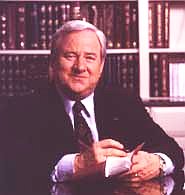 Though I normally don’t comment on the deaths of well-known people, I need to write about the loss of Jerry Falwell.
Though I normally don’t comment on the deaths of well-known people, I need to write about the loss of Jerry Falwell.
Al Mohler posted some thoughts on Falwell and the resulting comment firestorm caught me by surprise for its sheer mean-spiritedness on both sides. Even in death, Falwell proves a most polarizing figure.
I didn’t know Rev. Falwell at all. Never met him. I watched him preach a few times on TV, but honestly, I was more interested in following his ASL interpreter. (I was learning ASL at the time.) Falwell’s preaching didn’t do much for me.
I wish Falwell had not become the face of Evangelicalism. I cringed every time the press went to him or to Pat Robertson for comments on current events. But Falwell was a product of the South, and he spoke like a true Southerner: unashamed of his opinions and happy to let you know them. If you understood that, you understood the man.
So as much as I wasn’t a fan, I wish to comment on two important truths, one he reinforced and one he later said.
No matter what any Christian thinks of Jerry Falwell, he decisively answered a most important question that all Christians must consider: Does a sacred/secular divide exist?
For most of Christian history, the answer has been yes. Jerry Falwell said no. And I believe he was right.
We can’t underestimate the profundity of pulling down the curtain between the sacred and the secular. Many of us today fail to realize how much we’ve gained by understanding that all of life is sacred, and it loses none of its sacredness when it intersects with everyday living. Eliminating that divide better frames the Kingdom of God in its proper context. The Kingdom penetrates everything it touches when Christians advance.
Jerry Falwell believed that Christians should not be ashamed to enter secular realms with the Gospel. Before he came on the scene, too many of us lived a double life. He didn’t found the idea, but he made it popular for Christians to go into the highways and byways of the world confident in Christ.
We forget what it was like before Falwell, don’t we?
Sadly, while the idea reflects God’s heart, the execution of that mandate doomed itself by going too far. Instead of letting the light of Christ speak, we decided to make something happen. Like Moses striking the rock, we overstepped our bounds and made a laughingstock of Evangelicalism. We equated expanding the Kingdom into secular realms with attempting to rule it with a not-so-subtle iron fist. In effect, the mishandling of the elimination of the sacred/secular divide led to power grabs from overly smug Evangelicals, rather than a humble glowing of light from within the traditionally dark areas of life long ago abandoned by believers.
Such promise….
As for what Falwell said, this comment post-9/11 got a lot of press:
“I really believe that the pagans, and the abortionists, and the feminists, and the gays and the lesbians who are actively trying to make that an alternative lifestyle, the ACLU, People For the American Way, all of them who have tried to secularize America. I point the finger in their face and say, ‘You helped this happen.'”
Despite the fact that Falwell later apologized for the remark, I believe he was right—though not just in regard to the sins of those easy whipping boys.
For decades, America’s been gradually slouching toward Gomorrah. Some will claim the blame goes to the groups Falwell targeted in his comment. Others will say our lack of compassion for the poor, justice for the disenfranchised, and love for the least of these surpasses the sins of those other groups. Yet more will say that our materialism and pillaging of the planet at the the expense of other peoples and nations are the cause. Whatever the case, Falwell looked at 9/11 as a wake up call for the soul of our country.
Unfortunately, few of us seem to have answered that call. We just go on our merry way, humming a tune only we know, oblivious to signs of impending judgment.
So it’s hard not to see Jerry Falwell for what could have been. We Christians in America got Falwell for a spokesperson rather than a more Francis Schaeffer-like mouthpiece. Never one for subtlety, Falwell pushed everything fast, hard, and far. Excess toppled it all in the end.
Still, as much as some Christians are ashamed of Falwell for that excess, I can still thank him for making more of us aware of the truth that the Kingdom of God is not hemmed in. Christians do have a mandate to be salt and light in the most tasteless and dark places. If that’s ultimately his legacy, it’s a fine one to leave us.
